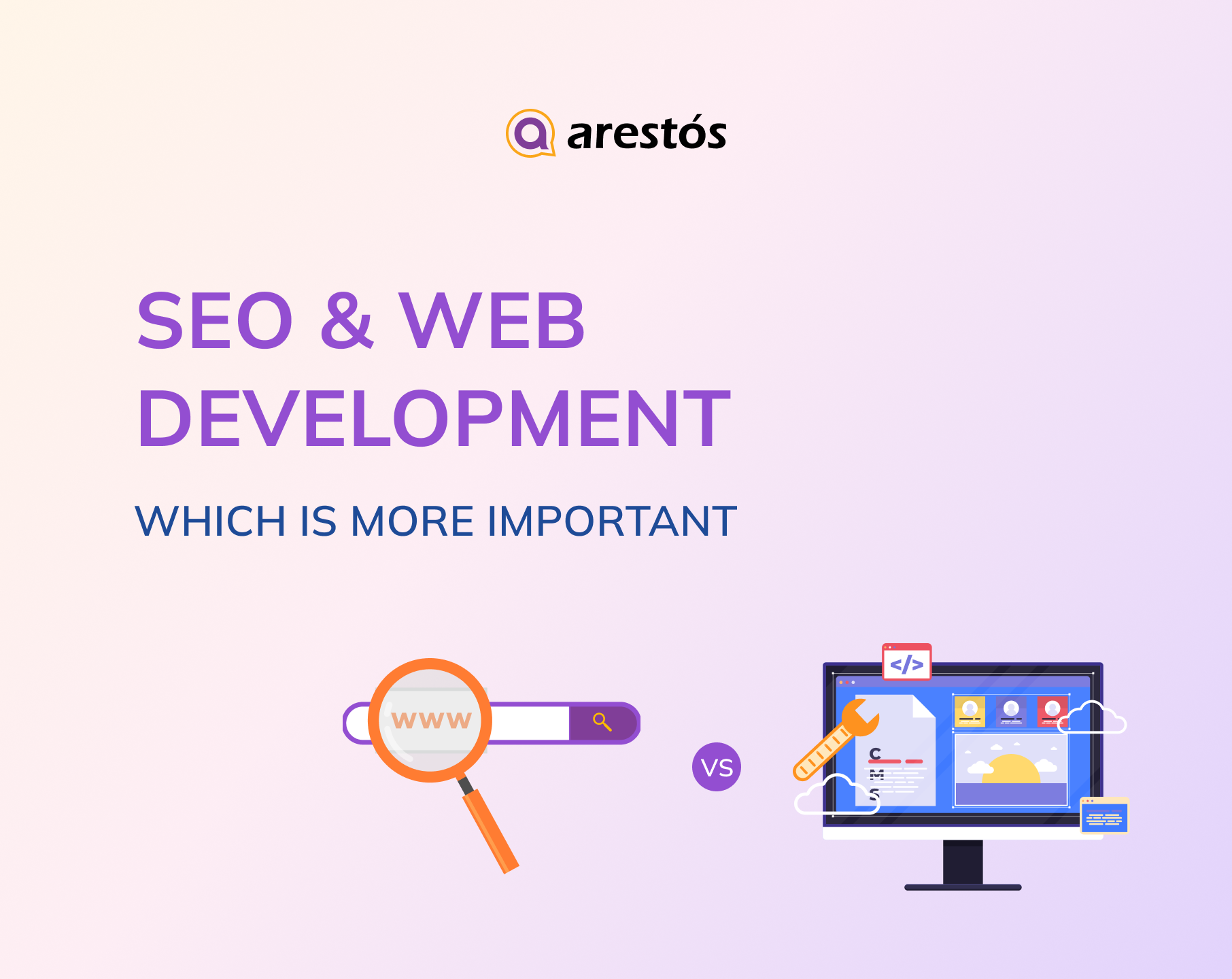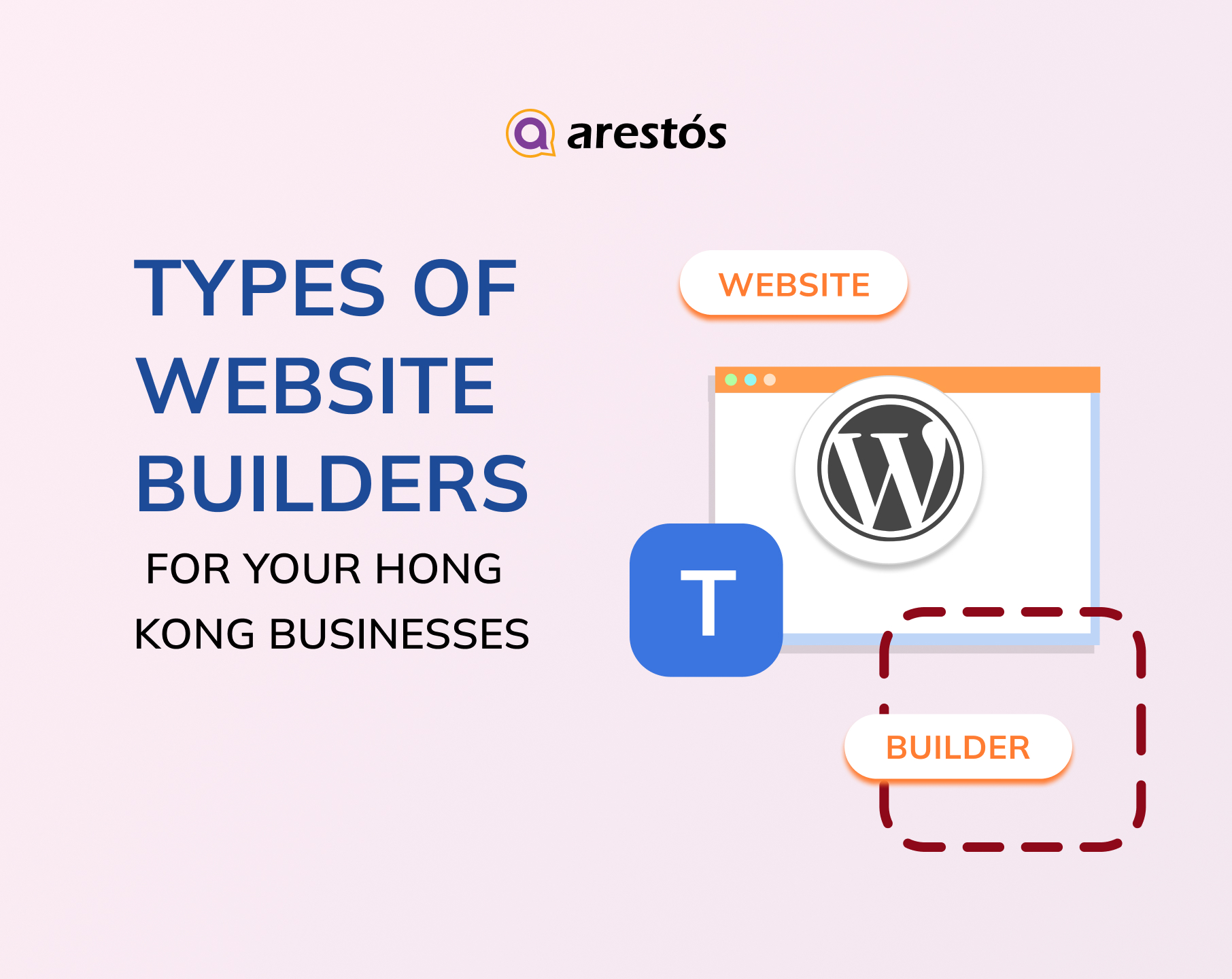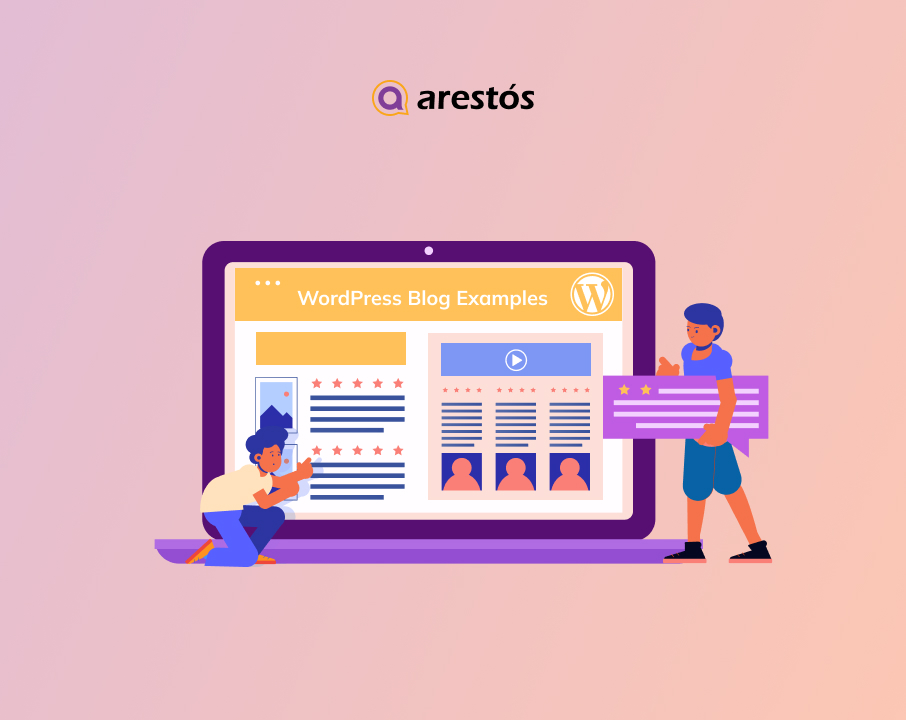Back to featured insights
SEO Vs Web Development: Which Is More Important
SEO vs Web Development is not a competition but a partnership. Discover how combining both can create a high-performing, visible website. Learn the strategies to align design, functionality, and search optimization for long-term success.
Table of Content
Share
In today’s digital world, the success of any website hinges on two critical elements: SEO vs Web Development. While these fields may seem distinct, understanding how they intersect and complement each other is essential for building websites that not only look great but also rank high on search engines.
This blog will explore the key aspects of both SEO and web development, helping you grasp their unique roles and how combining them effectively can drive your online success.
Overview of Web Development
What is Web Development?
Web development is the process of creating and maintaining websites. It covers various aspects, including web design, publishing, programming, and database management. Web developers use different programming languages and tools to build websites that are functional, user-friendly, and visually appealing.
Key Components of Web Development
Web development is typically split into two main areas: front-end and back-end development.
Front-End Development
Front-end development, or client-side development, focuses on everything users see and interact with directly, including layout, design, and interactivity. It uses languages like HTML, CSS, and JavaScript to create responsive, accessible user interfaces.
Back-End Development
Back-end development, also called server-side development, handles the server, database, and application logic that support a website’s front-end. Using languages like Python, Ruby, PHP, and Java, back-end developers build and manage databases, server scripts, and APIs, ensuring smooth communication between the server, application, and database for a seamless user experience.
Overview of SEO
What is SEO?
SEO (Search Engine Optimization) is the process of improving a website’s visibility in search engine results to attract more organic (non-paid) traffic. It involves optimizing content, website structure, and technical elements so search engines can better understand and rank the site. The goal of SEO is to drive relevant, high-quality traffic and improve a site’s chances of appearing at the top of search results for targeted keywords.
Key Components of SEO
SEO is typically categorized into two main types: on-page SEO and off-page SEO.
On-Page SEO
On-page SEO focuses on optimizing individual web pages to improve their rankings in search results. This involves enhancing the content, HTML source code, and meta tags. Key factors of on-page SEO include:
- Keyword Research: Identifying the most relevant keywords that potential visitors use to search for information related to your website.
- Content Quality: Creating high-quality, relevant, and engaging content that meets user intent.
- Meta Tags: Optimizing title tags, meta descriptions, and header tags to enhance search engine rankings.
- URL Structure: Ensuring URLs are clean, descriptive, and include relevant keywords.
- Internal Linking: Building a clear and user-friendly internal linking structure to help search engines grasp the content hierarchy and enhance user navigation.
Off-Page SEO
Off-page SEO encompasses actions taken outside of your website to boost its search engine rankings. This includes:
- Backlink Building: Obtaining high-quality backlinks from reputable websites to demonstrate trust and authority to search engines.
- Social Media Marketing: Sharing and promoting content on social media platforms to boost visibility and drive traffic.
- Brand Mentions: Increasing brand awareness through mentions on other websites and online platforms.
- Guest Blogging: Creating and publishing guest articles on other websites to gain exposure and build backlinks.
Web Development and SEO: How they complement each other
Web development and SEO should not be viewed as separate fields, as neither is more important than the other. Instead, they should be seen as two sides of the same coin in creating a successful website.
How Web Development Influences SEO
Web development is more than just building a website; it’s the architectural backbone that dictates the potential and limitations of any SEO strategy.
- Page Speed: Developers optimize code and images to increase page load speed. This directly improves user experience and is a critical Google ranking factor.
- Mobile-Friendliness: Developers build websites with responsive design, ensuring the site displays perfectly on all devices and meets Google’s “Mobile-First Indexing” requirement.
- Clean Code: Writing clean, structured code helps search engine bots easily crawl and understand your content, leading to more accurate indexing.
- Site Navigation: A logical navigation structure, built by developers, helps users find information easily. For SEO, this reduces bounce rates and distributes “link equity” more effectively.
- User Experience (UX): A fast, secure, and user-friendly website (the product of web development) generates positive user signals (like longer time on page, lower bounce rates) that Google uses to evaluate and rank the site.
- URL Structure: Developers set up systems to create clean, keyword-rich URLs, helping both users and search engines immediately understand the page’s content.
- Structured Data (Schema): Developers implement Schema markup provided by SEO specialists, which helps Google understand content more deeply and can result in rich snippets in search results.
- Technical SEO Elements: Web development helps automate the creation of XML Sitemaps (to show Google which pages to index) and manages the Robots.txt file (to block non-essential pages from being crawled).
- Website Security: Installing an SSL certificate to switch a site to HTTPS is a technical task. It serves as both a Google ranking signal and a way to build trust with users.
How SEO affects Web Development
Web Development builds a solid technical foundation and a smooth user experience, while SEO ensures that foundation is found, understood, and ranked highly by search engines.
Effective SEO is the fuel that drives organic traffic to your website.
- Drives a Focus on Speed and Performance: SEO requirements, particularly Google’s Core Web Vitals, compel developers to write efficient code, optimize images, minify CSS/JavaScript files, and leverage browser caching to ensure the fastest possible page load times.
- Mandates a Mobile-First Approach: Because of Google’s mobile-first indexing, SEO dictates that the mobile version of a site is paramount. This forces developers to build with a responsive design as a non-negotiable baseline, ensuring a flawless experience on all devices.
- Dictates Code and Site Architecture: For a site to be crawlable and indexable, SEO best practices require developers to use semantic HTML (proper heading tags, nav elements, etc.), create a logical site structure, and ensure that critical content is not hidden behind complex JavaScript that search bots can’t easily render.
- Governs URL Structure and Redirection: SEO demands clean, descriptive, and user-friendly URLs. It falls to developers to build systems that generate these URLs and, more importantly, to correctly implement 301 redirects when a page’s address changes to preserve link equity and user experience.
- Schema Markup: To achieve rich snippets in search results (like star ratings or FAQs), SEO specialists identify the need for Schema markup. It then becomes the developer’s task to accurately integrate this code into the website’s HTML.
- Enforces Website Security (HTTPS): Since having a secure site (HTTPS) is a confirmed Google ranking signal and a major trust factor for users, SEO effectively makes the implementation of an SSL certificate a standard technical requirement for web development projects.
Web Development and SEO: Which one is more important to your Web Performance
Web development and SEO are both vital for online success, each impacting different parts of the digital experience. Knowing how they contribute helps businesses allocate efforts and resources wisely.
The Role of Web Development
Web development forms the foundation of every website. It involves building, designing, and maintaining sites to ensure they are functional, easy to use, and visually attractive. Its importance comes from its ability to:
- Create a User-Friendly Experience: A well-built website delivers a smooth user experience, allowing visitors to easily navigate, find information, and complete desired tasks.
- Ensure Functionality and Performance: Web development guarantees that website features function properly, pages load swiftly, and the site is accessible across different devices and browsers.
- Establish Brand Identity: By combining thoughtful design with consistent visuals, web development helps build and strengthen a brand’s identity, creating a professional and trustworthy online image.
The Role of SEO
SEO is vital for boosting a website’s visibility in search engine results, attracting organic traffic, and enhancing online presence. Its importance can be summarized as follows:
- Increase Organic Traffic: By targeting relevant keywords and boosting search rankings, SEO brings more organic traffic to a website—often the most valuable kind of traffic.
- Enhance User Experience: SEO optimizes site structure, content, and performance, enhancing user experience and increasing engagement.
- Build Credibility and Trust: High search rankings indicate credibility and trustworthiness to users, boosting the brand’s overall reputation.
Challenges in Integrating Web Development and SEO
Common Issues
Integrating web development and SEO can present several challenges, such as:
- Communication Gaps: Poor communication and a lack of understanding between web developers and SEO specialists can result in missed opportunities and less effective website performance.
- Conflicting Priorities: Web developers often prioritize design and functionality, whereas SEO professionals concentrate on search engine visibility, which can lead to conflicts in decision-making.
- Technical Limitations: Certain SEO recommendations might involve technical changes that are challenging or time-consuming to execute.
Solutions and Best Practices
To overcome these challenges, it is essential to:
- Foster Collaboration: Foster regular communication and collaboration between web developers and SEO professionals to ensure that both viewpoints are integrated into decision-making.
- Prioritize User Experience: Strike a balance between SEO best practices and user experience to build websites that are both search engine-friendly and easy to use.
- Stay Informed: Stay current with the latest trends and updates in both web development and SEO to ensure the effective implementation of best practices.
The Future of Web Development and SEO
Web development and SEO are continuously evolving disciplines, with new trends and technologies frequently emerging. Key trends to keep an eye on in the future include:
- Optimizing for Voice Search: As voice assistants become more popular, optimizing websites for voice search will grow in importance.
- Leveraging AI and Machine Learning in Websites: AI and machine learning will play an expanding role in both web development and SEO, providing new possibilities for automation and optimization.
- Progressive Web Apps (PWAs): Progressive Web Apps (PWAs) provide a smooth user experience across various devices and platforms, with their adoption projected to rise in the coming years.
- Core Web Vitals: Google’s Core Web Vitals, which emphasize user experience metrics, will have a major impact on SEO rankings.
What Marketers Need to Understand About SEO vs Web Development
For marketers, having a clear understanding of the differences and details between web development and SEO is crucial for crafting successful digital marketing strategies. Below are key insights marketers should grasp to fully harness the power of web development and SEO:
- Bridging the Gap Between Development and Marketing: Marketers bridge the gap between web developers and SEO experts. Understanding both areas helps ensure effective collaboration and aligned marketing goals.
- Importance of User Experience (UX): Marketers must understand that user experience (UX) is vital for both web development and SEO. A user-friendly website attracts visitors and ranks better. Key UX principles include easy navigation, fast loading, and mobile responsiveness.
- SEO Starts with Development: SEO starts with web development, not after. Marketers should integrate SEO from the beginning by choosing search-friendly URLs, good site structure, and ensuring mobile-friendliness and fast loading to avoid costly fixes later.
- Content and Technical SEO: Content is king, but needs strong technical SEO support like meta tags, image alt attributes, and schema markup. Marketers should work with developers to implement these for better content visibility and impact.
- Analytics and Performance Monitoring: Both web development and SEO depend on data and analytics to gauge success. Marketers should know tools like Google Analytics and Search Console to monitor site performance, user behavior, and SEO metrics, enabling data-driven decisions and proving ROI.
- Continuous Improvement and Adaptation: The digital world is always changing with new tech and updates. Marketers must stay updated on web development and SEO trends through ongoing learning and encourage a culture of innovation in their teams.
- Collaboration and Cross-Functional Teams: Effective digital marketing relies on clear teamwork between developers, SEO, content creators, and designers to build user-friendly, high-performing websites.
Tools and Resources
SEO Tools for Developers
Below is a list of tools tailored for developers to tackle SEO challenges, featuring both free and paid options:
Google Search Console
- Description: Delivers detailed insights into how Google perceives your website, covering indexing status, search queries, and overall performance.
- Free/Paid: Free
- Key Features: Search analytics reports, index coverage, mobile usability analysis, and crawl issue detection.
Screaming Frog SEO Spider
- Description: A desktop application that scans your website to detect potential SEO problems.
- Free/Paid: Free version with limitations / Paid version for full functionality.
- Key Features: Identifies broken links, detects duplicate content, analyzes meta tags, and generates XML sitemaps.
Ahrefs Webmaster Tools
- Description: Offers a comprehensive overview of your website’s SEO health, backlink profile, and keyword performance.
- Free/Paid: Free plan with limited features / Paid version for full access.
- Key Features: Conducts site audits, analyzes backlinks, and tracks keyword rankings.
SEMrush
- Description: An all-in-one SEO platform offering tools for site audits, keyword discovery, and competitor research.
- Free/Paid: Paid, with select free tools available.
- Key Features: Performs site audits, conducts keyword research, analyzes traffic, and evaluates competitors.
Moz Pro
- Description: Provides a range of tools for keyword analysis, link-building strategies, and website audits.
- Free/Paid: Paid, with a free trial option available.
- Key Features: Conducts site audits, tracks keyword performance, analyzes backlinks, and supports on-page SEO optimization.
GTmetrix
- Description: Assesses your site’s performance and delivers recommendations to boost loading speed and enhance user experience.
- Free/Paid: Free version available, with an upgraded paid pro option.
- Key Features: Website speed analysis, detailed performance scoring, and actionable optimization tips.
PageSpeed Insights
- Description: A Google tool that evaluates your website’s speed and overall performance.
- Free/Paid: Free.
- Key Features: Generates performance scores, offers improvement suggestions, and compares mobile and desktop results.
Lighthouse (Chrome DevTools)
- Description: An open-source platform that audits website performance, accessibility, and SEO compliance.
- Free/Paid: Free.
- Key Features: Conducts performance reviews, evaluates accessibility, and checks adherence to SEO best practices.
Screaming Frog Log File Analyser
- Description: Examines server log files to reveal how search engine bots crawl and interact with your website.
- Free/Paid: Paid.
- Key Features: Analyzes crawl data, tracks bot activity, and generates detailed log file reports.
WebPageTest
- Description: Delivers in-depth performance testing for web pages, with results available from multiple global locations.
- Free/Paid: Free version available, with an upgraded paid option.
- Key Features: Website performance analysis, waterfall chart visualization, and tailored optimization suggestions.
Development Tools for SEO Specialists
These tools help SEO professionals collaborate with developers by focusing on code analysis, performance testing, and more:
GTmetrix
- Description: Offers detailed insights into your website’s performance along with actionable suggestions for enhancement.
- Free/Paid: Free version available, with a paid pro upgrade.
- Key Features: Performance evaluation, improvement recommendations, and historical performance tracking.
Google PageSpeed Insights
- Description: Evaluates page speed and overall performance, providing practical suggestions for optimization.
- Free/Paid: Free.
- Key Features: Performance scoring, actionable improvement tips, and insights for both mobile and desktop platforms.
Lighthouse (Chrome DevTools)
- Description: Reviews your website’s performance, accessibility, and SEO compliance.
- Free/Paid: Free.
- Key Features: Performance metrics, accessibility evaluations, and adherence to SEO best practices.
Web.dev Measure
- Description: Offers performance, accessibility, and SEO insights developed by the Web.dev team.
- Free/Paid: Free.
- Key Features: Core Web Vitals analysis, detailed performance metrics, and practical SEO recommendations.
SEO Site Checkup
- Description: Provides a comprehensive set of tools to assess site health, covering SEO, mobile usability, and page speed.
- Free/Paid: Free version available, with an optional paid upgrade.
- Key Features: Conducts site audits, performs SEO evaluations, and generates performance reports.
Sitebulb
- Description: A desktop-based SEO audit tool that delivers visual reports and valuable insights.
- Free/Paid: Paid, with a free trial available.
- Key Features: Comprehensive site audits, data visualization, and practical, actionable recommendations.
Ahrefs
- Description: Provides an all-in-one set of tools for SEO and website analysis, featuring keyword research and site auditing capabilities.
- Free/Paid: Paid, with some free tools available.
- Key Features: Backlink analysis, in-depth site audits, and keyword performance tracking.
SEMrush
- Description: An all-in-one platform for SEO analysis, keyword discovery, and competitor insights.
- Free/Paid: Paid, with some free tools available.
- Key Features: Site auditing, keyword research, and traffic performance analysis.
Screaming Frog SEO Spider
- Description: A desktop application for crawling websites and detecting potential SEO issues.
- Free/Paid: Free version with limitations / Paid version for full features.
- Key Features: Website crawl data, SEO issue identification, and visual site mapping.
Frequently Asked Questions
1. Which should come first: SEO or Web Development?
Ideally, both should be integrated from the start. Incorporating technical SEO elements during the development phase helps avoid costly adjustments later.
2. Is SEO part of Web Development?
SEO and Web Development are separate disciplines, but they are closely connected. Technical SEO directly overlaps with Web Development.
3. Which is better: SEO or Web Development?
It really depends on your objectives. SEO is all about boosting a website’s visibility and ranking in search engine results, while Web Development is focused on creating and maintaining the site’s structure, design, and functionality. Both are essential, and for long-term online success, they work best when combined.
4. What is the difference between Web Development and SEO?
Web Development builds and maintains a website’s design, code, and functionality. SEO optimizes its content, structure, and technical setup to improve visibility in search engines. In short, development creates the site, and SEO helps people find it.
Conclusion
In this article, we explored the essential roles of SEO and web development, two key factors that determine a website’s success. SEO boosts search rankings and drives organic traffic, while web development ensures a smooth, user-friendly, and technically sound website. When these two fields work closely together, they maximize the effectiveness of your online business strategy.
At Arestós, we offer professional web development services focused on creating websites that are not only visually appealing but also optimized for performance and user experience. Our team stays updated with the latest technologies to ensure your website meets both technical standards and SEO requirements, helping you achieve sustainable online business growth.
Contact us today for personalized consultation and solutions tailored to your needs!
Subscribe to our newsletter!
Get updated to
the lastest IT trends





